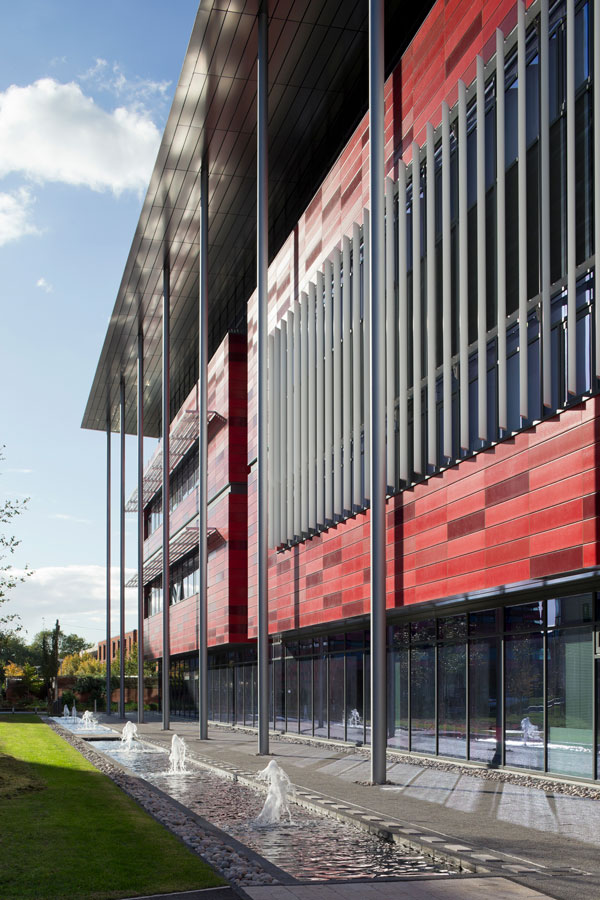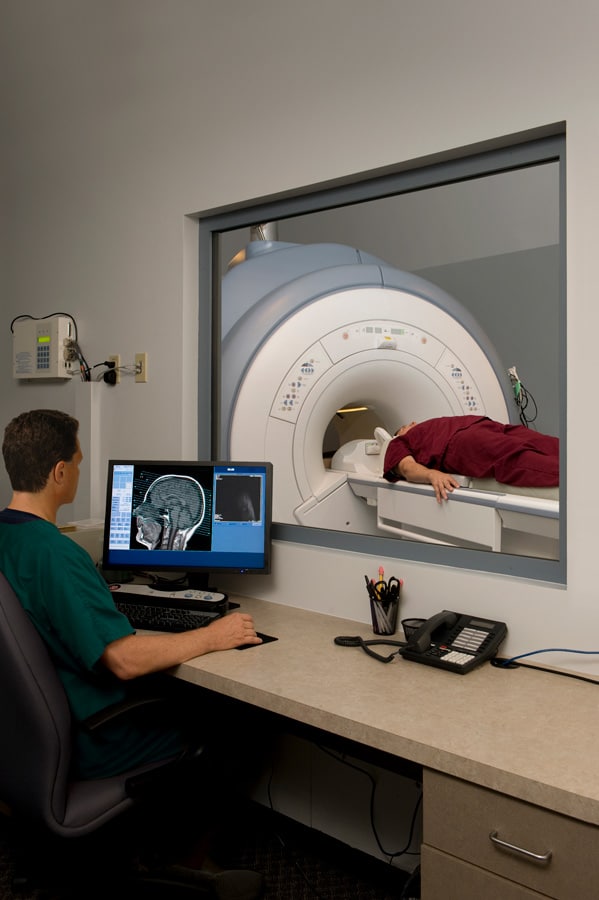Better together: How a multidisciplinary team is seeking new ways to tackle cognitive problems in MS patients
The multidisciplinary team are combining their specific areas of expertise – Professor das Nair is a psychologist, Dr Evangelou is a neurologist and Professor Dineen is a neuroradiologist – to approach the challenge of cognitive problems from different angles. For example, while one aspect of the research uses MRI scans to investigate how different parts of the brain work together, another project will look at the potential impact of cognitive rehabilitation.
The three experts explain the challenges they face in investigating cognitive problems in MS – and how the unique combination of their different skillsets opens up new opportunities to tackle these problems.

Could you tell us a bit about yourselves and your areas of interest?
Roshan das Nair: I am a clinical psychologist, an academic and a clinician. My areas of interest are multiple sclerosis (MS), traumatic brain injuries, and stroke. I specialise in designing and conducting randomised controlled trials of ‘complex interventions’ (interventions that rely on a number of interlocking parts to work well together to produce a desired outcome).
Nikos Evangelou: I am a clinical neurologist and associate professor of neurology, with an interest in MS and other brain diseases. I see patients in the clinic and, with my research, I try to find ways to minimise the impact of MS in their lives.
I have seen so many [MS] patients lose their jobs because of cognitive challenges at work, even when they appear physically fit.
Rob Dineen: I am a neuroradiologist. I use brain scanning techniques, particularly MRI scans, to study brain diseases. My work focusses on using MRI to understand why some people with MS experience cognitive problems, and how different treatments may be able to help.

Why is it so important to look at the cognitive impact of MS?
RdN: Cognitive problems affect 40-60% of people with MS. These problems affect their attention, memory, and planning abilities, which has a knock-on effect on their personal, work, and social life. These problems are persistent and can be difficult to treat. Cognition is a fundamental aspect of our daily life.
NE: Patients tell us about their memory problems and their difficulties in multitasking. I have seen so many patients lose their jobs because of cognitive challenges at work, even when they appear physically fit.
Why do you think cognitive problems have been overlooked in the past?
RdN: In MS, cognitive problems were identified as early as 1877 by Charcot, but we’re still learning about so many aspects of cognition. I personally think it’s been largely overlooked in clinical practice because (i) it’s an ‘invisible’ symptom, (ii) some people with MS and clinicians don’t link cognitive problems with MS, (iii) it’s been seen as difficult to treat, so (iv) there’s no point in assessing these problems. But this is changing…
We want to … find effective treatments for cognitive symptoms that can be used in hospital clinics up and down the country and all over the world.
NE: With time pressures in NHS clinics, doctors concentrate on symptoms they can treat with medicines or operations. Sadly, we haven’t got a medicine that makes memory better in MS and as medical teams, we’ve slightly lost our focus.
RD: In the past we couldn’t do the MRI studies that we are now working on. Only within the past few years have MRI scanning techniques become powerful enough for us to really explore what is going on in the brains of people with MS who have cognitive problems.

Roshan, you lead the NEuRoMS project at University of Nottingham and IMH. What is the focus and aim of this project?
RdN: The NEuRoMS (Neuropsychological Evaluation and Rehabilitation in Multiple Sclerosis) project aims to: (i) develop a neuropsychological evaluation pathway, to routinely assess all people with MS, who attend NHS MS clinics, for cognitive problems, and (ii) develop and test a brief intervention for people with MS with ‘mild’ cognitive problems. Our aspiration is that everyone with MS gets their cognitive abilities routinely screened. Where problems are identified, they can be quickly addressed by clinicians, so that people with MS can deal with these problems effectively. Details can be found at www.neuroms.org
How else has the Nottingham MS Research Group helped to fill the knowledge gaps around cognition and MS?
RdN: Our research into cognition spans the breadth of scholarship, from understanding neural networks, to testing innovative technology-mediated brain stimulation and cognitive rehabilitation. While we use tried and tested research designs, we also apply a critical lens to these methods to develop them further. We have completed the largest clinical trial of cognitive rehabilitation in MS and have led Cochrane Systematic Reviews in the area.

RD: We are also using MRI scans to see how different parts of the brain link up as a network, and how MS impacts on the functioning of these networks. Understanding this will help us to develop treatments that target the important brain networks for improving cognitive problems.
NE: Our colleagues in The Netherlands showed that by using transcranial magnetic stimulation (one of the many forms of brain stimulation) we can improve some cognitive functions. We have recently tested a new, faster form of magnetic stimulation, with promising results. Rob, with the help of the team, has recently won a grant from the MS Society to determine whether it is feasible to do a clinical trial testing this form of stimulation in the MS clinics.
You all have diverse specialisms. What advantages does that give you as a team?
RdN: We believe in Team Science! The issues we are trying to understand and our interventions are so complex that I don’t believe any single discipline can provide all the answers. The advantage of working in such a multidisciplinary team is that we all bring to the table our unique perspectives to solve the same problem, and this enables considerable creativity in finding solutions.
NE: The prototypical ‘mad scientist’ working in a basement on their own rarely finds discoveries that can solve big problems. Not only are our skills complementary but we also ask and receive help and input from many other specialists, too many to mention, both from Nottingham, the UK and abroad.



RD: We all bring something different to the table (or party, depending on the time of day!)
Are there any challenges when taking such a multidisciplinary approach?
RdN: Yes! But that’s part of the fun. Sometimes we may not have a common language to describe phenomena that we’re studying, and I find some of the imaging methods and analyses baffling (but equally intriguing). But I think the key is to find the threads that connect all our approaches and to keep our common goal in sight: better patient care.
NE: Indeed, we see problems from different angles and sometimes we have to translate our findings and our observations to the rest of our team. It can get complicated but most researchers thrive on complexity and we are no exception.
RD: Actually, I don’t really see challenges, just opportunities. Every time we meet up we generate ideas and I learn something new. It’s a pleasure and privilege to have that interaction.

What are your ambitions for the future of research into cognition and MS?
RdN: I’ve got two. First, the Holy Grail for treatments for cognitive problems is determining how to individualise treatments and figuring out the right ‘dose’ for maximum benefits with the least amount of resources. And second, how best to implement such treatments into our health and social care systems.
NE: Like Roshan, I was attracted to medicine to help people. We want to contribute to find effective treatments for cognitive symptoms that can be used in hospital clinics up and down the country and all over the world. I think we will succeed!
RD: MRI scanning techniques are powerful and elegant, but are just a means to an end. Like Roshan and Nikos, I want to find treatments that positively impact on people’s lives.
What needs to be done to make sure these ambitions can be achieved?
RdN: The Nottingham MS Research Group is a multi-disciplinary collective from the University of Nottingham, Nottingham University Hospitals NHS Trust, and the Institute of Mental Health. Based on our expertise on cognition and other MS symptoms, we wish to establish a Centre of Excellence in MS Symptom Management in Nottingham. I think this will enable us to take our research to the next level, where we need to determine how cognitive problems link with other MS symptoms, so that we can provide more holistic care for people with MS and support for their families.

NE: Cognitive symptoms and other symptoms management in MS has not been the focus of sufficient research. Symptoms management research should be recognised as being as important as trying to find what causes MS.
RD: People with MS tell us that this research is important. We need to make sure this message is heard by funding bodies and healthcare providers so that all research groups working in this area (not just us!) can make real progress.